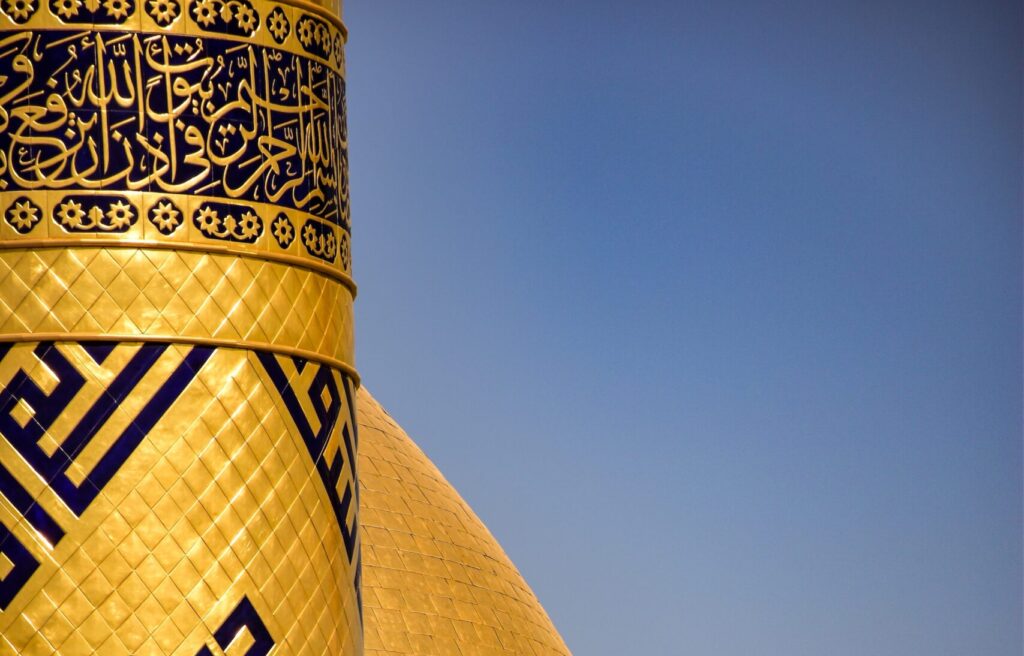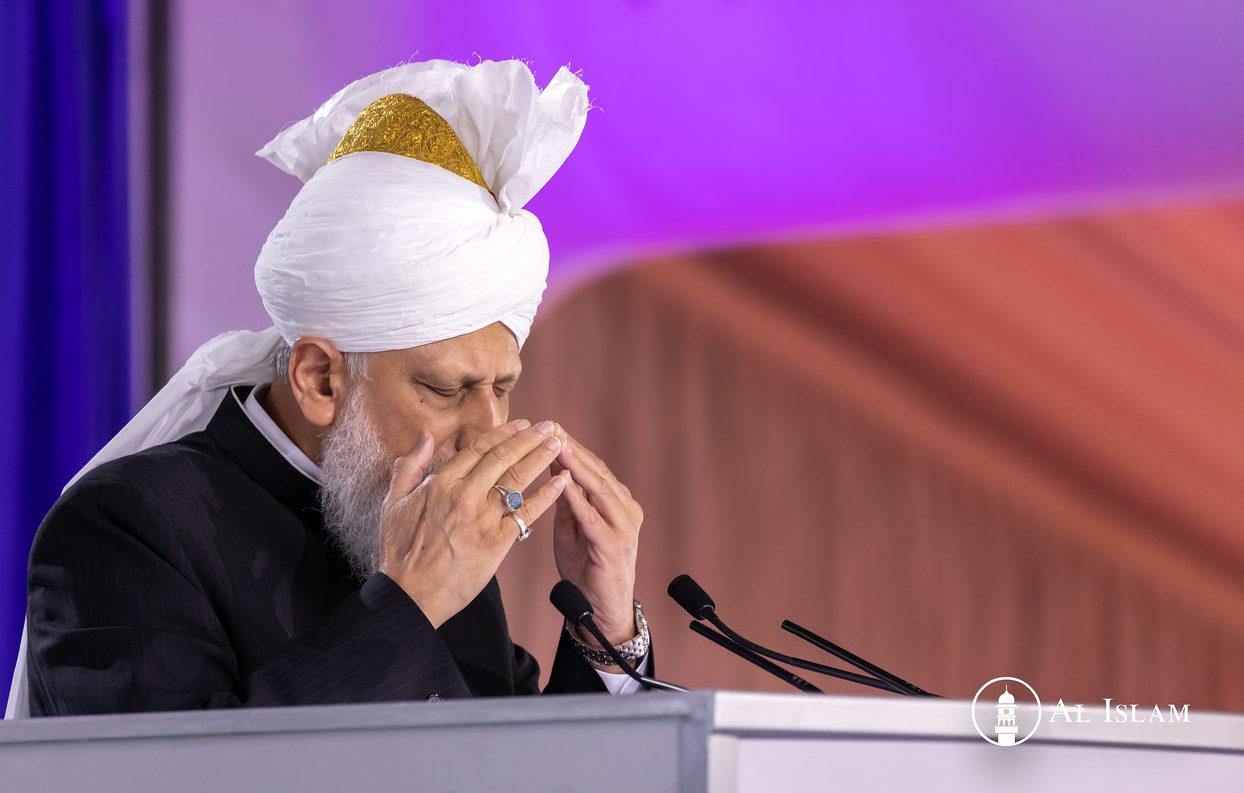It is inconceivable to contend that the noble companions, who were spiritually nurtured by the Holy Prophetsa himself, could have played any role in the conflicts that culminated in the event of Karbala.
THOOBA BASHEER, ERNAKULAM
JULY 28, 2023
It was the night before the fateful day.
“If only death would cause my end today! After my mother Fatima, father Ali and brother Hassan (passed away), you alone were our support”[1], said Hazrat Zainabra to her brother, whom she watched preparing to confront an army of four thousand, accompanied by only 72 adherents. Every word she uttered conveyed the immense pain she was enduring, as it seemed like the strings of fate had already been woven. The next day unfolded, bearing witness to the most heart-wrenching of events, that has been forever etched in Islamic history as an episode painted in strokes of sorrow.
The tenth of Muharram marked a day when a series of tragic events transpired. The desert plain of Karbala witnessed the culmination of political and military disorder that was a continuation of the martyrdom of Hazrat Uthmanra. Rather, it would not be wrong to say that the course of events leading to this unfortunate state of affairs began after the passing of Prophet Muhammadsa.
Witnessing the rapid expansion of Islam beyond the Arabian peninsula following the demise of the Holy Prophetsa, many people who harboured hatred against Islam sought to destroy it. However, seeing that it was impossible now to oppose the might of Islam with force, they chose to do it covertly, disguised as friends. Hence, they accepted Islam outwardly and started sowing the seeds of discord and attacking the unity of Muslims.[2]
As one traverses through the chain of events that followed, which not only resulted in the martyrdom of the three caliphs of Islam but also multiple civil wars among Muslims, one cannot fail to notice the fact that the companions of the Holy Prophetsa continued to uphold the true Islamic principles and always remained committed to justice.
In the early days of Islam, when faced with physical torture, social boycott and abuse that lasted for many years, it was their unwavering devotion to their faith and resolve for justice without any care for their own lives that led these companions to victory even when defeat seemed like the most obvious outcome. Hence, it would be inconceivable to contend that these noble souls, who were spiritually nurtured by the Holy Prophetsa himself, could have been swayed by worldly temptations.
More than anyone else, this relentless determination to uphold justice is exemplified in the person of Imam Hussainra. Hence, to remain passive would have been contradictory to the virtuous nature of Hazrat Hussainra, especially when he had been receiving letters about the oppression faced by the people of Kufa under the rule of Yazid, who had unjustly claimed his title, violating the existing treaty. The treaty had been signed by Hassanra to avoid bloodshed and on the condition that the ruler would be just and would not establish a dynasty[3]. Thus, it was in the interest of justice for Hazrat Hussainra to stand up and challenge the tyranny.
Yet, Imam Hussainra was ready to leave when he discovered that the people of Kufa did not reflect the same emotions as conveyed in their letters. Upon encountering the army of Al-Hurr, who intercepted Imam Hussainra at the behest of Yazid, Hussainra addressed them:
“I did not come to you until your letters came to me, and they were brought by your messengers (saying), ‘Come to us for we have no Imam. Through you may Allah unite us under guidance and truth.’ Since this was your view, I have come to you. Therefore give me what you guaranteed in your covenants and (sworn) testimonies. If you will not and (if you) are (now) averse to my coming, I will leave you (and go back) to the place from which I came.”[4]
These words evidently indicate it had not been the title of Khilafat that motivated Imam Hussainra to fight but the injustice that was meted out to the people of Kufa. He also made a similar offer to leave right before the battle of Karbala began, but the other side was determined to end this just soul.[5]
While the tragedy of the battle of Karbala is in itself soul-stirring for the Muslim world, it is even more agonising that this episode of cruelty and the events that culminated in it are often quoted, by those who are less aware of the history, to depict the companions in a negative light. Although those who conspired and acted behind this entire state of affairs claimed to be Muslims and pronounced the Islamic creed, they did not truly comprehend the spirit of Islam.
Hence, it is beyond unsettling to presume that the eminent and devoted companions of the Holy Prophetsa deviated to such an extent that they fell into conflict in merely a few years.
To gain a proper understanding of the matter warrants a careful study of the very root of such conflicts. This is where the findings of Hazrat Mirza Bashiruddin Mahmud Ahmadra, the Second Caliph of the Ahmadiyya Muslim Community, hold prime significance. In his book The Outset of Dissension in Islam, he falsified the notion that certain eminent companions were responsible for the disorder in Islam and that Hazrat Uthmanra was – God forbid – a weak Caliph.
Reading through the series of events explained within the book provides ample insight into how the mischief created by a small group of people, who had accepted Islam without much knowledge or harboured malice in their hearts towards Islam, served as the root cause of all conflicts.
What started with fabricated tales of oppression by regional governors and pleas to replace them eventually resulted in the demand to kill the Khalifa of the time. The noble and exemplary persona of Uthmanra becomes as clear as daylight when one learns how he handled each of the fabricated complaints brought to him by the rebels. Despite the deceit and rancour of his opposers, Hazrat Uthmanra extended his wings of mercy so wide that it was only his mercy and inclination to forgive that saved their lives. Hazrat Mirza Bashiruddin Mahmud Ahmadra writes about this:
“In perilous times when the blood of even the most patient of men boils with rage, Hadrat Uthmanra adopted such a manner that those who were thirsty for his blood could not even find the lamest excuse to kill him.”[6]
Such was the selflessness of the Caliph of Islam that even when an army of thousands was at his door with the intention of his death, no strategy was devised to save himself and would even stop those who tried to save him by saying, “Leave! Do not put your lives in danger. These people only hold enmity for me; they have no objection against you.”[7]
Yet the companions left no stone unturned in ensuring that they did not fail in fulfilling their obligation towards the Caliph, be it Hazrat Alira, Hazrat Talhara or Hazrat Zubairra, who are often alleged of secretly conspiring against Hazrat Uthmanra[8]. Even Imam Hassanra, known as the ‘prince of peace’, took up the sword to protect Uthmanra when rebels attempted to enter the home of the Caliph. The son of Talhara defended the Caliph of Islam just like his father guarded the Prophetsa of Islam at Uhud[9]. The fervour and loyalty displayed by the companions during this phase of trial without any care for their lives testify to the fact that no rift had ever been created among the pious companions of the Holy Prophetsa and the glory of Islam still shone bright as the devotion and spirituality of most Muslims never faltered even once.
In short, the unfortunate martyrdom of Uthmanra and its subsequent perils leading up to the martyrdom of Imam Hussainra can only be understood as trials that Muslims had to undergo owing to the actions of some people who fell prey to worldly desires.
Painful tragedies share an uncanny ability – one that seeps into the very fabric of man’s collective conscience. Such events resound with the cries of injustice and echo through generations, leaving an indelible mark on our souls. But merely being shaken up, shedding tears and carrying out processions do not help. Instead, it becomes incumbent upon us to uphold the same principles and imbibe the same values that the noble companions portrayed, even during the toughest of trials. It was the unflinching sense of unity among the companions that helped them triumph against great empires, and it is the absence of such unity that is allowing for the oppression of Muslims and the targeting of Islam today. The remedy to this lies in submitting to the leader appointed by God.
“Hold fast to the Jamaat of Muslims and their Imam.”[10]
END NOTES
[1] Tarikh Ibn Kathir, p. 514
[2] A comprehensive exposition of this view can be found in the book The Outset of Dissension in Islam by Hazrat Mirza Bashiruddin Mahmud Ahmadra, the Second Caliph of the Ahmadiyya Muslim Community
[3] Kitab al-Futuh by Ibn al-Atham v. 4, p. 160
[4] Kitab al-Irshad by Shaykh al-Mufid (English transalation by I K A Howard) p. 309
[5] Ibid p. 324-325
[6] The Outset of Dissension in Islam by Hazrat Mirza Bashiruddin Mahmud Ahmadra p. 148
[7] Ibid p. 128
[8] Ibid p. 128
[9] Ibid p. 135-136
[10] Sahih al-Bukhari, Kitab al-Fitan (Book on Afflictions)












0 Comments